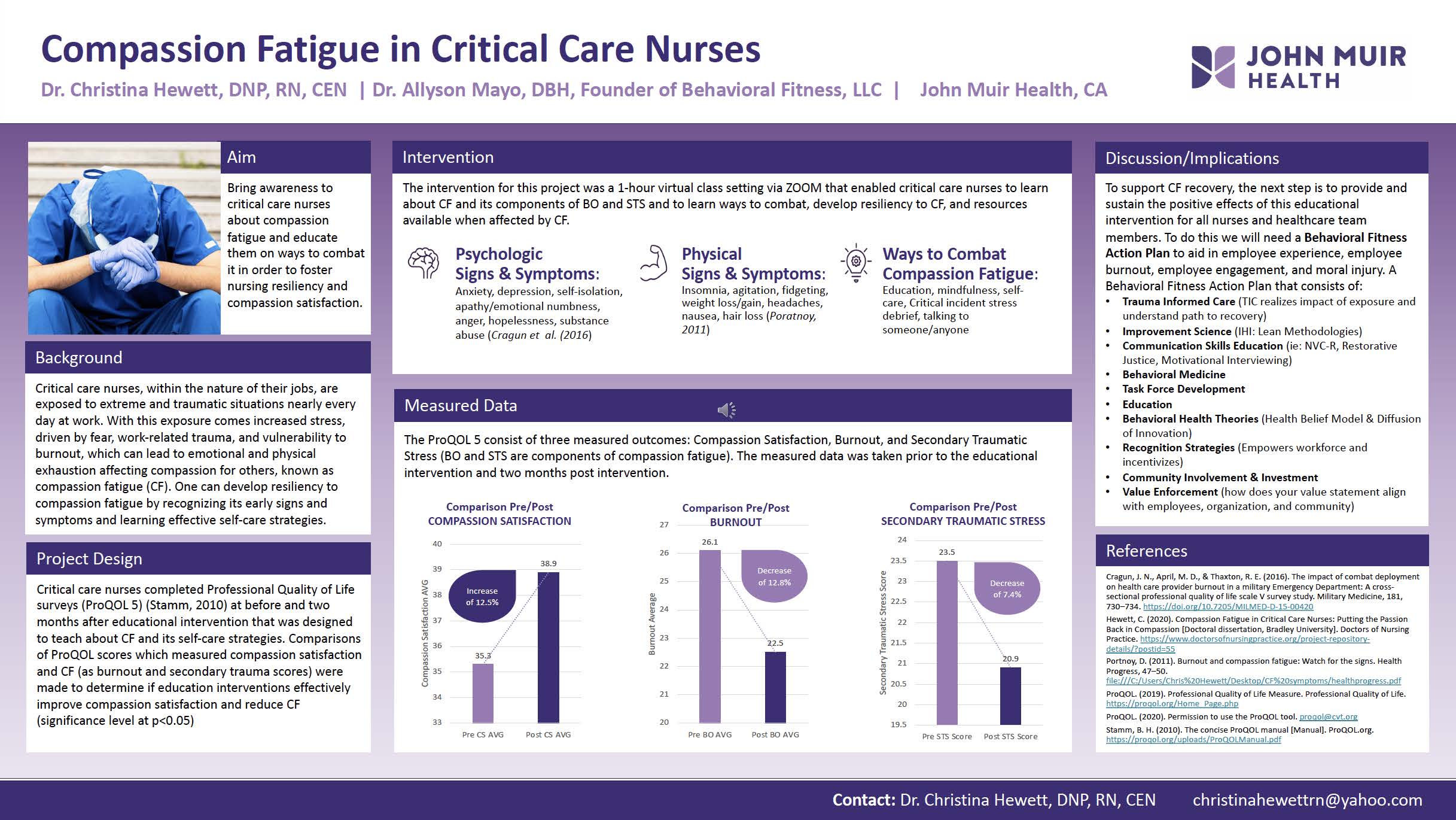Poster Title: Compassion Fatigue in Critical Care Nurses
Organization or Hospital: John Muir Health, CA
Authors: Dr. Christina Hewett, DNP, RN, CEN | Dr. Allyson Mayo, DBH, Founder of Behavioral Fitness, LLC
Conference Name: Tipton Conference 1
Presentation Date: May 05, 2022

Project Summary:
Aim: Bring awareness to critical care nurses about compassion fatigue and educate them on ways to combat it in order to foster nursing resiliency and compassion satisfaction.
Background: Critical care nurses, within the nature of their jobs, are exposed to extreme and traumatic situations nearly every day at work. With this exposure comes increased stress, driven by fear, work-related trauma, and vulnerability to burnout, which can lead to emotional and physical exhaustion affecting compassion for others, known as compassion fatigue (CF). One can develop resiliency to compassion fatigue by recognizing its early signs and symptoms and learning effective self-care strategies.
Project Design: Critical care nurses completed Professional Quality of Life surveys (ProQOL 5) (Stamm, 2010) at before and two months after educational intervention that was designed to teach about CF and its self-care strategies. Comparisons of ProQOL scores which measured compassion satisfaction and CF (as burnout and secondary trauma scores) were made to determine if education interventions effectively improve compassion satisfaction and reduce CF
(significance level at p<0.05)
Methods:
Intervention: The intervention for this project was a 1-hour virtual class setting via ZOOM that enabled critical care nurses to learn about CF and its components of BO and STS and to learn ways to combat, develop resiliency to CF, and resources available when affected by CF.
- Psychologic Signs & Symptoms: Anxiety, depression, self-isolation, apathy/emotional numbness, anger, hopelessness, substance abuse (Cragun et al. (2016)
- Physical Signs & Symptoms: Insomnia, agitation, fidgeting, weight loss/gain, headaches, nausea, hair loss (Poratnoy, 2011)
- Ways to Combat Compassion Fatigue: Education, mindfulness, self-care, Critical incident stress debrief, talking to someone/anyone
Results:
Measured Data:
The ProQOL 5 consist of three measured outcomes: Compassion Satisfaction, Burnout, and Secondary Traumatic Stress (BO and STS are components of compassion fatigue). The measured data was taken prior to the educational intervention and two months post intervention.
Conclusion:
To support CF recovery, the next step is to provide and sustain the positive effects of this educational intervention for all nurses and healthcare team members. To do this we will need a Behavioral Fitness Action Plan to aid in employee experience, employee burnout, employee engagement, and moral injury. A Behavioral Fitness Action Plan that consists of:
• Trauma Informed Care (TIC realizes impact of exposure and understand path to recovery)
• Improvement Science (IHI: Lean Methodologies)
• Communication Skills Education (ie: NVC-R, Restorative Justice, Motivational Interviewing)
• Behavioral Medicine
• Task Force Development
• Education
• Behavioral Health Theories (Health Belief Model & Diffusion of Innovation)
• Recognition Strategies (Empowers workforce and incentivizes)
• Community Involvement & Investment
• Value Enforcement (how does your value statement align with employees, organization, and community)
References:
Cragun, J. N., April, M. D., & Thaxton, R. E. (2016). The impact of combat deployment on health care provider burnout in a military Emergency Department: A cross-sectional professional quality of life scale V survey study. Military Medicine, 181, 730–734. https://doi.org/10.7205/MILMED-D-15-00420
Hewett, C. (2020). Compassion Fatigue in Critical Care Nurses: Putting the Passion Back in Compassion [Doctoral dissertation, Bradley University]. Doctors of Nursing Practice.
https://www.doctorsofnursingpractice.org/project-repository-details/?postid=55
Portnoy, D. (2011). Burnout and compassion fatigue: Watch for the signs. Health Progress, 47–50.
ProQOL. (2019). Professional Quality of Life Measure. Professional Quality of Life. https://proqol.org/
ProQOL. (2020). Permission to use the ProQOL tool. proqol@cvt.org Stamm, B. H. (2010). The concise ProQOL manual [Manual]. ProQOL.org. https://proqol.org/uploads/ProQOLManual.pdf
Contact Person(s):
Tipton Health

